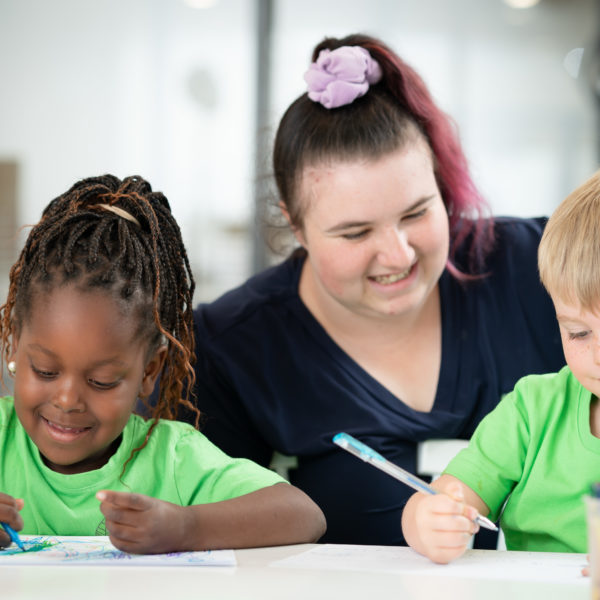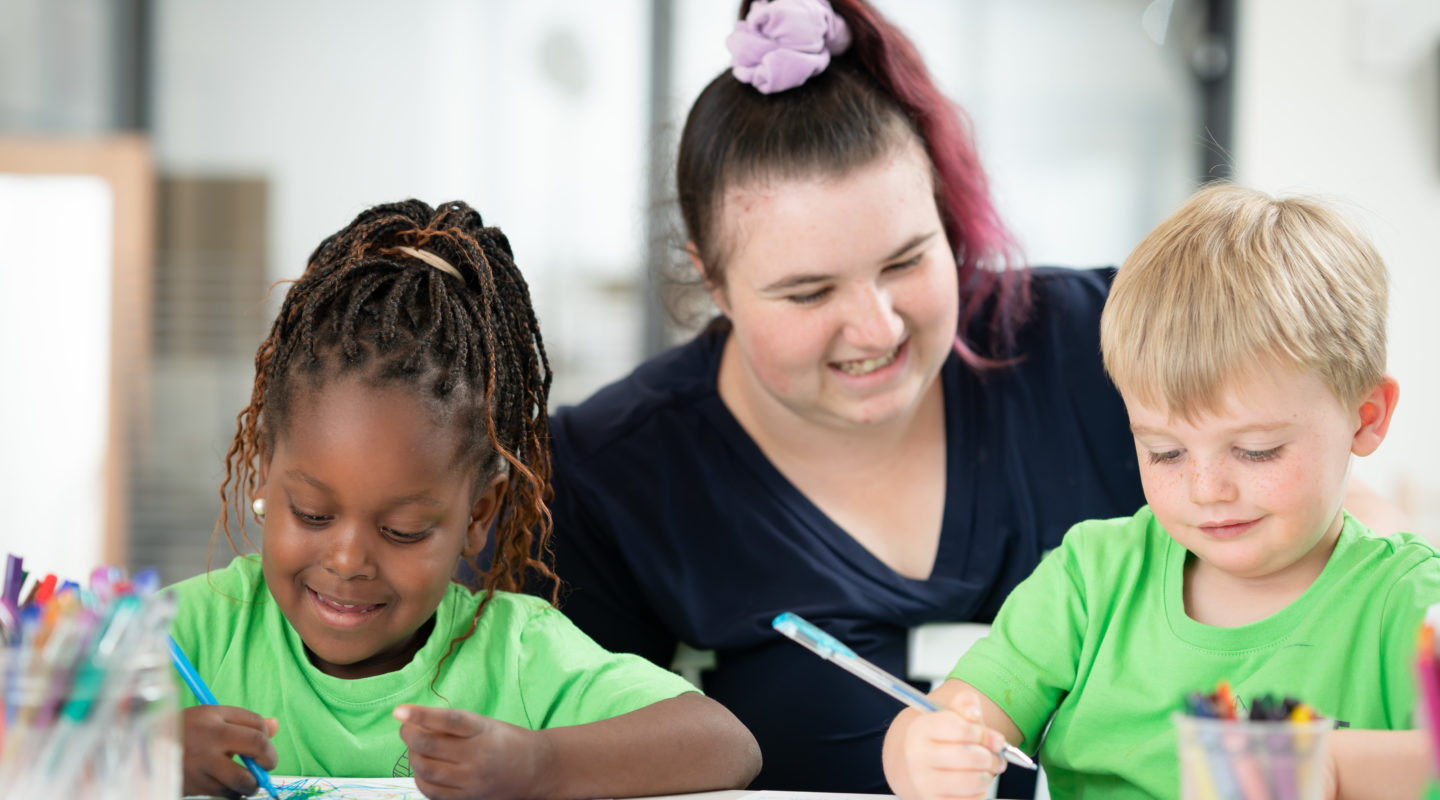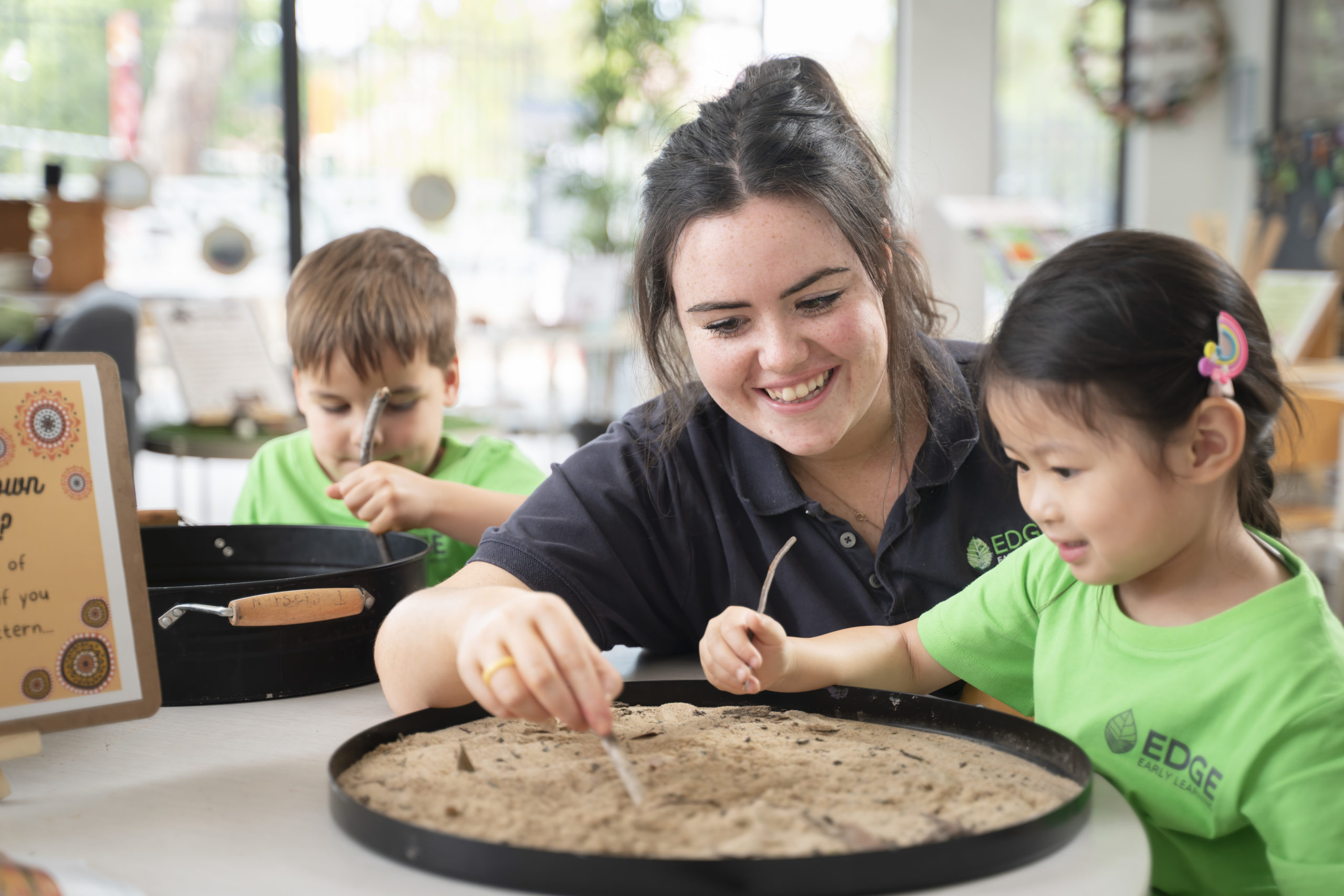
Take part in conversations, tell stories and use adult forms of speech


At Edge Early Learning, we understand the importance of the transition to primary school, and our Kindergarten program is designed to prepare children for this exciting milestone. The program not only equips children with the academic skills they need but also nurtures their social and emotional development, ensuring they are well-prepared for the challenges and opportunities that lie ahead.
Our philosophy is centred around a holistic style of learning through an inquiry-based learning approach. Children are encouraged to ask questions, explore new ideas, and learn through play. This approach is supported by the Early Years Learning Framework (EYLF V2.0), which emphasises play-based learning to guide children toward their developmental goals.
We have harnessed the importance of learning through structured play-based learning by encouraging children to learn and explore interests across a range of STEAM-based subjects including Science, Technology, Engineering, Arts, and Maths.

Take part in conversations, tell stories and use adult forms of speech

Enjoy playing, sharing and cooperating with other children

Hops, jumps and runs with ease

Increased attention span, memory and recall

Climbs with alternating feet
Young children aged between 3 to 5 years old will start to make leaps and bounds in their language and communication skills as they transition from toddlers into young children. This includes the ability to form complex sentences, an interest in telling their own stories and actively engaging in discussions with friends, family and loved ones.
From explaining how their day was, to activities they have completed throughout the day, or talking about topics that interest them. This helps your child refine their language skills as they incorporate new words and grammatical structures into their vocabulary.
At this stage in your child’s life, reading is a great way to introduce your child to new vocabulary, enhance literacy comprehension and elevate storytelling skills. Edge Early Learning encourages children to grow their language and communication skills through structured activities such as group discussions, role-playing and guided story creation.
Our educators also provide opportunities for children to participate in ‘show and tell’. Children will bring either a special book or photo from home and share this in front of other children. This activity enables your child to build up a sense of self-confidence, engage in conversations with peers (Q&A), share about their culture and identity and demonstrate the ability to speak clearly and concisely.
Throughout our kindergarten program, children will learn basic mathematics and numeracy which lay strong foundations for future schooling success. At this age, your child will begin to understand simple mathematical concepts such as counting and identifying shapes or patterns.
At Edge Early Learning, our educators support these skills through engaging in hands-on activities such as counting objects, matching numbers, sorting shapes and basic addition and subtraction problems. Our educators also use puzzles, building blocks and shape-sorting games for children to identify and differentiate shapes and patterns in a positive and engaging way.
One example of this is ‘meaningful counting’, when children physically touch an object and count on. Children who complete this activity will begin building a good relationship with numbers and objects. Many educators do this using rocks, counters and blocks to build this skill.
Another key to success with early numeracy is block play. Our educators enable children to create spaces such as farms and then use props like animals to enhance their imaginative play. Through this activity, in our program children will learn to negotiate the play space safely, share and take turns.
Around the ages of 3 to 5 years old, children will begin to form their first friendships and meaningful relationships. This is important for their personal, social and emotional growth as they learn new skills such as sharing, taking turns and cooperating with others. These initial friendships are invaluable for teaching children to practice empathy, communicate feelings and navigate conflicts which is vital to social development.
Edge Early Learning encourages children to engage and interact with each other through our kindergarten program. We do this through group play, collaborative projects and guided activities to teach children the importance of teamwork and respecting others.
As your child experiences these encounters for the first time, they will begin to foster strong interpersonal skills as well as a sense of belonging and emotional well-being. These initial interactions and learnings will form the building blocks needed for creating healthy relationships throughout their lives.
In our kindergarten program, your child will learn how to self-regulate as they manage new emotions, express their feelings and develop empathy for others. You may notice your child begin to understand and label their emotions as well as the emotions of others.
As children learn to navigate emotions, you may notice they will develop new strategies to manage frustration such as deep breathing or seeking the comfort of loved ones. Once they gradually learn how to manage their feelings, they are able to successfully navigate social situations with more emotional awareness.
At Edge Early Learning, we recognise kindergarten and preschool is an important time for learning emotional self-regulation. We also understand educators play a vital role in creating a supportive and understanding environment for growth. Our qualified teachers will model emotional responses and teach children to both identify and express their feelings as well as provide tools for managing strong emotions.
This includes activities such as role-playing, storytelling and group discussions. Each of these activities allows children to practice empathy, perspective-taking and positive social behaviours. By nurturing these skills, our educators enable children to develop the emotional resilience and interpersonal skills needed for continued growth and success.
Kindergarteners will experience significant development in their gross motor skills over the years of 3 to 5 years old which will improve their physical fitness and coordination. Throughout this period in your child’s life, they will learn the basics of running, jumping, climbing and balance which will be crucial for active play and daily activities.
Throughout our kindergarten program at Edge Early Learning, children will develop these skills through outdoor play sessions, obstacle courses, jumping on a trampoline, climbing on play structures, balancing on beams, and skipping on stepping stones. As well as structured games like hopscotch and relay races.
By encouraging children to engage in active play through our program, each child learns how to support their own physical development and lay the foundations for building a healthy and active lifestyle.
Your child will also begin to develop their fine motor skills through the coordination of small muscles in the hands and fingers. Fine motor skills are important foundations for working up to complex tasks such as writing, buttoning clothes and using utensils. You may notice your child improve their hand-eye coordination and dexterity through tasks such as drawing, cutting with scissors, beading or using building blocks.
At Edge Early Learning, our early learning kindergarten program supports the development of fine motor skills in children through activities such as drawing with crayons, markers and paintbrushes as well as crafting by cutting, gluing and pasting. As well as teaching all children how to use scissors safely and effectively, playing with puzzles, threading beads and playing building-block games to refine coordination and control.
For example, educators in our kindergarten program will promote drawing and writing by having specific environment set-ups dedicated to these tasks. Our ateliers are perfect for this space with collage trolleys and dedicated shelving units so that children always have access to the tools they need. By allowing children to practice their fine motor skills, our educators help children build important foundational skills needed for everyday tasks and academic success.
A holistic approach to play-based learning and structured activities is important for a child’s development. Play-based learning allows children to use their curiosity, imagination and creativity to explore and play independently. This learning style also encourages children to experiment with roles and scenarios to enhance their problem-solving, interpersonal skills and gross motor skills.
On the other hand, structured activities use a guided learning experience to build up specific skills and knowledge such as literacy, numeracy and fine motor development. This style of learning is guided by our educators and can help children develop discipline, learn how to follow instructions and work towards goals. Our kindergarten program uses a combination of these learning styles to set your child up for success.
At Edge Early Learning, our bachelor-qualified educators understand the developmental stages and needs of each and every child. This allows them to create individualised learning plans tailored to support a child’s growth and learning style. Throughout our kindergarten and preschool program, educators will assess each child’s progress through observation and interaction. Based on this assessment, our educators will then adapt learning experiences where needed to encourage a child’s cognitive, social, emotional and physical development.
This personalised approach enables each child to thrive as they feel valued and understood as individuals. Subsequently boosting their confidence and motivation to learn and grow to set them up for future academic success.
The most notable milestones in a child’s third to fifth year of life include:
Interested in our early learning program for preschoolers and kindergarteners? Enquire online today to learn more, join a waitlist or book a tour to secure your child’s place in our next intake. Set your child up for success with Edge Early Learning today!
